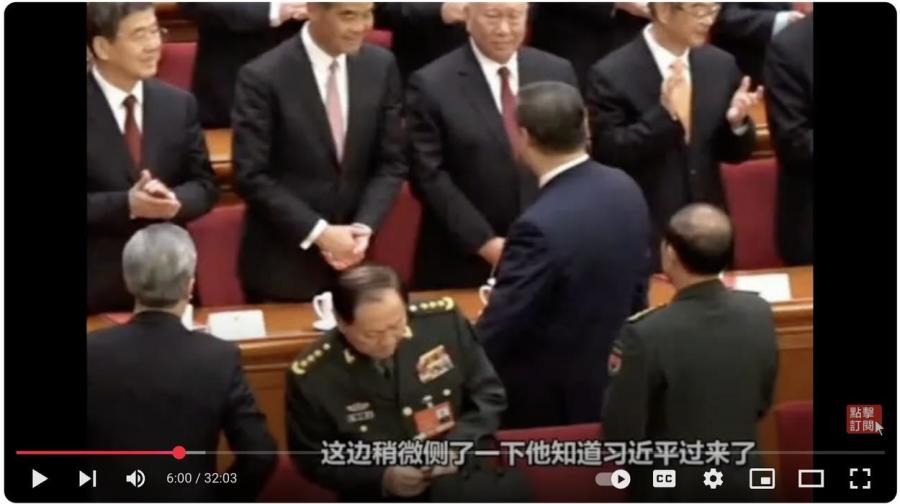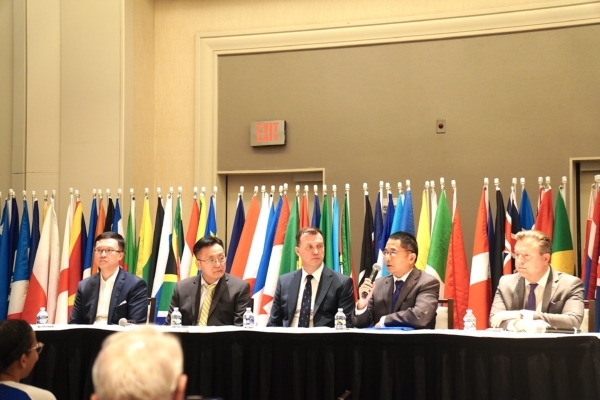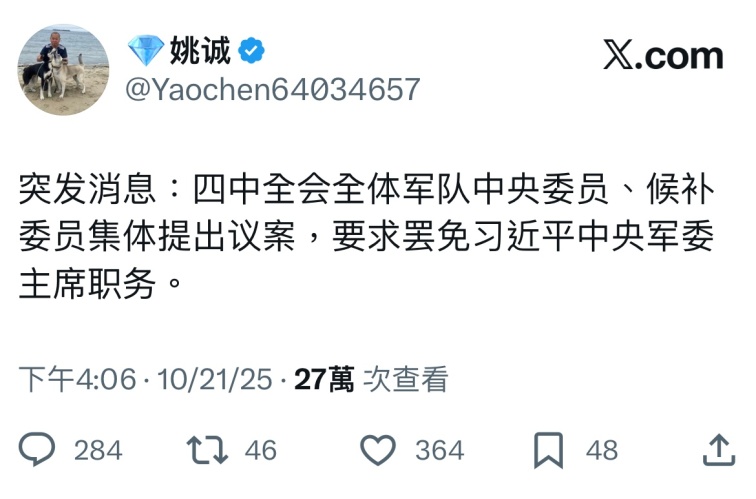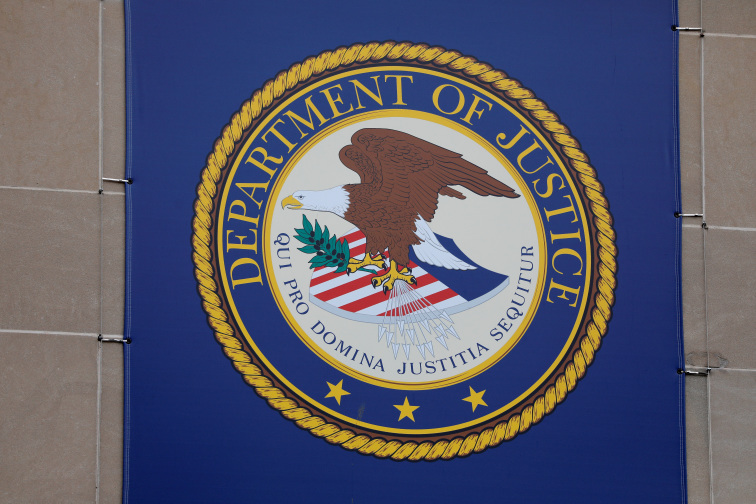During the closing ceremony of the Two Sessions, video footage showed that as Xi Jinping was leaving, several Politburo members, including Vice Chairman of the Central Military Commission (CMC) He Weidong, turned around and stood by their seats to watch Xi depart. However, Zhang Youxia remained facing forward, not even glancing back as Xi walked past behind him. (Screenshot from video)
[People News] Yao Cheng has disclosed that the military has collectively proposed a motion to remove Xi Jinping from his role as Chairman of the Central Military Commission.
On the afternoon of October 21, former Navy Lieutenant Colonel staff officer Yao Cheng revealed that all central committee members and alternate members of the military at the Fourth Plenary Session have collectively put forward a motion calling for the removal of Xi Jinping from his position as Chairman of the Central Military Commission. Yao Cheng stated, "This source is very reliable, coming from a member of the conference affairs group, who indicated that this is a serious matter, and the military can no longer tolerate it."
This news is highly explosive. The Fourth Plenary Session has been ongoing for three days, yet the party media remains completely silent, as if the meeting does not exist at all. Meanwhile, public opinion outside the party is in an uproar, with various versions of the meeting's internal details circulating online, including lists of new Standing Committee members, the Chairman of the Military Commission, and members of the Military Commission. Regardless of the version, the overarching implication is that Xi Jinping is set to lose power, and the Fourth Plenary Session may mark Xi Jinping's political Waterloo.
The credibility of Yao Cheng's revelation remains uncertain to the outside world. However, we can briefly analyse the possibility and feasibility of removing Xi Jinping from the position of Chairman of the Military Commission by considering some regulations within the Chinese Communist Party.
Analysis of Historical Precedents for the Removal of the Chairman of the Military Commission in the CCP
Firstly, throughout the history of the Chinese Communist Party (CCP), there has never been a case of replacing the Chairman of the Central Military Commission through organisational procedures and a dismissal motion. This is regarded as an 'anomaly' in the CCP's highest power transition methods and has not happened to date. Lin Biao, Hua Guofeng, and Zhao Ziyang were removed from their positions or had their roles as Vice Chairman or Chairman of the Military Commission revoked, but even in urgent circumstances, these actions were generally conducted through relatively complete organisational procedures, including review and approval by the Politburo, voting by the Central Committee plenary session, and official publication of documents.
Secondly, according to the internal regulations of the CCP, such as the 'Party Constitution', 'Regulations on the Work of the Central Committee of the Communist Party of China', 'Approval Authority and Procedures for Disciplinary Actions Against Party Members', and 'Regulations on the Formulation of Internal Laws of the Communist Party of China', as well as the so-called 'Constitution of the People's Republic of China' and the relevant procedural rules and proposal clauses of the National People's Congress and the Chinese People's Political Consultative Conference, there are no established organizational procedures for directly 'dismissing the Chairman of the Central Military Commission'.
Thirdly, can a motion for the 'dismissal of the Chairman of the Central Military Commission' be advanced through indirect procedures, thereby achieving the goal of legally replacing the highest commander of the CCP's military? Let's analyse this in light of the revelations from Yao Cheng.
Legitimacy and Procedure of the Joint Motion by Central Military Committee Members
Yao Cheng stated, 'All military central committee members and alternate members collectively proposed a motion at the Fourth Plenary Session, requesting the dismissal of Xi Jinping from the position of Chairman of the Central Military Commission.'
According to the regulations of the Chinese Communist Party (CCP), members of the Central Committee are allowed to collectively propose motions. However, it is unclear whether they can propose a motion to remove the Chairman of the Central Military Commission. There is no explicit rule stating whether this is allowed. In theory, the Chairman of the Central Military Commission is elected by the plenary session of the Central Committee, which also has the authority to 're-decide' the composition of the Central Military Commission. In practice, however, all power within the CCP derives from military force and is exercised in a top-down manner. The resignation of Hua Guofeng was effectively orchestrated by Deng Xiaoping, who compelled Hua to recognise the situation and 'actively' resign from his roles as Party Chairman and Chairman of the Military Commission. His resignation was approved during the Sixth Plenary Session of the Eleventh Central Committee in June 1981.
The internal regulations of the CCP do not specify a minimum number of Central Committee members required to jointly propose a motion for it to be considered valid. However, there are clear thresholds for joint proposals in state institutions, such as the National People's Congress and its Standing Committee, as well as local people's congresses. For instance, a delegation of more than thirty representatives can jointly propose a legal bill to the National People's Congress, while local people's congress proposals often require more than ten people to be valid.
Given that Zhang Youxia effectively controls military power, he can arrange for military Central Committee members, and even non-military members, to jointly propose a motion to remove Xi Jinping from his position as Chairman of the Central Military Commission. Naturally, the more members involved, the better, as this reflects the military's morale and the opinions within the Party.
However, proposing a motion is merely the first step. To be included in the formal agenda, it must be processed by the CCP's Politburo and submitted for discussion at the Central Committee plenary session, which will depend on the opinions and decisions of the Politburo and the Standing Committee of the CCP.
The practical operational path for the removal procedure.
In practical terms, if members of the Central Committee wish to initiate the dismissal or investigation of the Chairman of the Central Military Commission, the process involves forming a joint proposal and submitting it to either the General Secretary's Office of the Central Committee or the General Office of the Central Committee. This office then forwards the proposal to the Standing Committee of the Political Bureau, which decides whether to include the issue in the agenda of the Political Bureau meeting. If the Political Bureau agrees, the matter can be brought before the plenary session of the Central Committee for discussion. For the plenary session to successfully vote on the dismissal, at least half of the Central Committee members must be present, and a two-thirds majority is required for approval. It is important to note that alternate Central Committee members can express opinions collectively but do not possess voting rights.
From a procedural legitimacy standpoint, a crucial factor in dismissing Xi Jinping from his role as Chairman of the Central Military Commission is the necessity of review by the Political Bureau meeting. This requirement is established by the party constitution, which states that the plenary session of the Central Committee is convened by the Political Bureau.
Historical example: The ousting of Hua Guofeng and Zhao Ziyang
Hua Guofeng's removal took place between November 10 and December 5, 1980, during which the Political Bureau of the Central Committee convened nine consecutive meetings to criticise him. The final decision made in these meetings was that Hua would no longer lead central work, and it was resolved to recommend to the Sixth Plenary Session that Hua resign as Central Chairman and Chairman of the Military Commission, with Hu Yaobang elected as Chairman of the Central Committee and Deng Xiaoping as Chairman of the Central Military Commission. Following the meetings, the Central Political Bureau informed the party that Hua Guofeng had committed five significant errors.
From June 19 to June 21, 1989, the Chinese Communist Party (CCP) convened an expanded meeting of the Politburo, primarily aimed at criticising Zhao Ziyang. Subsequently, from June 23 to June 24, the 4th Plenary Session of the 13th Central Committee reviewed and approved a report titled 'Report on the Errors Committed by Comrade Zhao Ziyang During the Anti-Party and Anti-Socialist Turmoil,' which was presented by Li Peng on behalf of the Central Politburo. As a result, Zhao Ziyang was stripped of his positions as General Secretary of the Central Committee, Standing Committee Member of the Central Politburo, Member of the Central Politburo, Central Committee Member, and First Vice Chairman of the Central Military Commission. Although Zhao Ziyang attempted to defend himself at the plenary session, his efforts were in vain.
In terms of the dismissals of high-ranking military officials such as Xu Caihou, Guo Boxiong, Wei Fenghe, and Li Shangfu, these cases were investigated by the Military Discipline Inspection Commission. The Central Politburo then reviewed and approved the proposed actions against them. Following this, the central government reported the cases and transferred them to the judiciary in accordance with the law, with the Central Committee later confirming these decisions at the plenary session. This process followed the pattern of 'initial handling followed by later confirmation,' but none of these actions bypassed the Politburo.
Recent unusual events: The peculiar circumstances surrounding the investigation of nine generals
What is particularly unusual is that on the evening of October 17, a spokesperson for the CCP's Ministry of National Defence unexpectedly announced the investigation of Generals He Weidong and Miao Hua, bypassing both the Politburo's review and the party media's reporting. This is highly irregular and underscores the deep contradictions between the military and Xi Jinping. It also highlights Zhang Youxia's extraordinary measures during this critical period, marking a first in the history of the CCP. However, it is worth noting that the nine generals had already been detained and were under investigation by the Military Discipline Inspection Commission prior to this announcement.
Returning to the topic introduced at the beginning of the article, will the members and alternate members of the military central committee collectively propose a motion to remove Xi Jinping from his position as Chairman of the Central Military Commission during the Fourth Plenary Session? Will this motion be approved by the plenary session? According to standard procedures, a department must investigate and verify the proposals from committee members, compile a report, and submit it for discussion and approval by the Politburo before it can be voted on by the plenary session. This standard process cannot be completed in the few days allocated for the Fourth Plenary Session. Taking such a step would be extremely risky, unless it is a last-ditch effort.
In other words, the saying holds true: the Chinese Communist Party's power comes from the barrel of a gun, and special matters are handled in a special way. Once the gun chamber is opened, any process can be simplified or bypassed. Furthermore, Zhang Youxia (张又侠) is not acting alone; he has a significant backing of senior officials and returning faction members. What advantages does Xi Jinping possess? Aside from his inherent legitimacy as the current leader of the party, government, and military, he is essentially holding a losing hand.
Chinese affairs expert Wu Zuolai (吴祚来) remarked on his X platform: 'If Xi is not removed, the handling of the nine generals will present challenges. Therefore, these two major issues must be resolved together. If they are not resolved, Xi Jinping may retaliate, and Zhang Youxia and his allies could be labelled as an anti-party faction. The case of the nine generals has been unusually publicised, indicating that the military is already challenging Xi Jinping. From purging the emperor's side to abolishing military power, it is indeed a fight to the death.'
It appears that at the Fourth Plenary Session, a confrontation between Zhang Youxia and Xi Jinping is inevitable.
(First published by People News) △











News magazine bootstrap themes!
I like this themes, fast loading and look profesional
Thank you Carlos!
You're welcome!
Please support me with give positive rating!
Yes Sure!